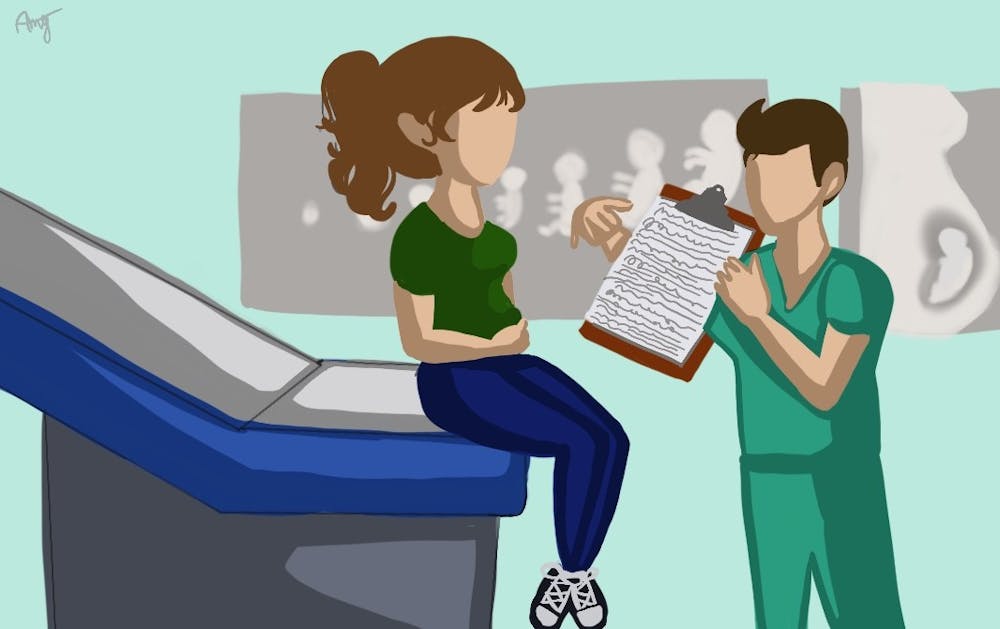A new bill in the Arizona House of Representatives would allow for people who obtain an abortion and the physicians who perform abortions to be charged with homicide.
The primary sponsor of the bill, Rep. Walter Blackman, R-Snowflake, said House Bill 2650 would extend protections offered under the 14th Amendment, which grants citizenship to all people born or naturalized in the U.S., to an unborn child. Opponents, however, say the legislation is unconstitutional.
Blackman's bill, introduced on the on the 48th anniversary of Roe v. Wade, which gave people the right to seek an abortion, would allow people who have gotten abortions to be prosecuted on homicide charges. Blackman said he has since amended the bill so that people would not be prosecuted, but instead be provided with resources to support a pregnancy.
“I amended the bill to take the mother out of the equation when we're talking about the law or being consequences under the law,” Blackman said. “The original bill said that the mother would be placed in jail. I disagree with that because there are other situations that may happen where that mother just cannot handle the pregnancy or handle the birth of the baby.”
Rep. Athena Salman, D-Tempe, who said the bill is unconstitutional, also said the original language of the bill still stands since it has never been given a hearing.
“The bill still stands that women and doctors can potentially be sentenced to death for exercising the constitutional right to reproductive healthcare,” Salman said.
Bertha Manninen, a professor at the School of Humanities, Arts and Cultural Studies and co-author of “Civil Dialogue on Abortion,” said she believes people still view abortion as a procedure that must be hidden and that the proposed legislation would drive abortions "underground."
“People who are well off will always be able to obtain abortions,” Manninen said. “Poorer women will have to turn to underground abortion providers, and we all know from our experiences before Roe v. Wade was legalized that these ‘back alley’ abortions often result in infections and possibly even death.”
HB 2650 defines life from the moment of fertilization and establishes that an unborn child is entitled to the same rights as any "person" under the language of the Constitution. Manninen said that to declare a fetus as a "person" under the law would have consequences that extend beyond abortion.
“If embryos are persons from conception, discarding embryos would be akin to homicide,” Manninen said. “What about women who miscarry? Will they be subject to an investigation to some voluntary action?”
Blackman, who is concerned with the abortion rates in the Black community, said the abortion rights movement has targeted Black individuals in the past.
“When we look at how abortion came to be with Margaret Sanger, how it was targeted towards the Black community and now how there are more Planned Parenthoods in Black communities, you will see there are more ads that are directed to the Black community to abort their baby rather than try to save their baby,” Blackman said.
Mary Ziegler, a professor at Florida State University College of Law who studies the constitutionality of abortion, said people have attributed the higher abortion rate to factors such as the living wage, poverty, structural racism and access to family planning or sex education.
“I don't think that’s proof of targeting,” Ziegler said. “It's just as likely to be proof that society is continuing to fail these people and that even some of those people who would probably like to bring those pregnancies to term, all things being equal, feel that their choices are constrained in ways that other people don't.”
HB 2650 is one of several anti-abortion bills that have been introduced in Arizona. Ziegler said there is a sense in many state legislatures that the Supreme Court could overturn Roe v. Wade after former President Donald Trump appointed three conservative justices.
“It has sort of set off a race in seeing states like Arizona to be the state where Roe is overturned and it has also started a conversation about what states want their abortion policies to look like if there is no more Roe,” Ziegler said.
Reach the reporter at eforquer@asu.edu and follow @eryka_forquer on Twitter.
Like The State Press on Facebook and follow @statepress on Twitter.
Continue supporting student journalism and donate to The State Press today.




